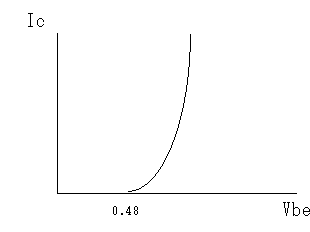The way setting bias to 2SC1775 was shown at past page. It is called self-bias.

Set 2V to Vb, and Ic flow spontaneously to make Vbe 0.6V. This sequence happens
automatically.So this is called self-bias.
You may say No, this story differs past one? I say this story is more suitable for the
phenomenon. For Vbe is not constant strictly. It varies by the level of Ic.
Vb=Vbe+Ve
Set 2V to Vb, in the early moment Ic=0, thus Ve=0V. Therfore Vbe=2V, Ic is going
to be several amperes. But as soon as current begins to flow, Ve increases and Vbe
decrease. So Ic will settle down to the adequet level.
This is called current feedback by emitter R.
To understand this graphically, Look at chart of transistor.
( This chart is schematic one. True chart is in following site below.)
Hitachi semiconductor
at 25 ℃, Vcc=12V

In 2SC1775A output current ascends from 0.48V of bias voltage.It increases
exponentially.
Next, as Vbe and Re is in series, draw a line of 350Ω' R inversely.

Cross point indicates Ic.
Index